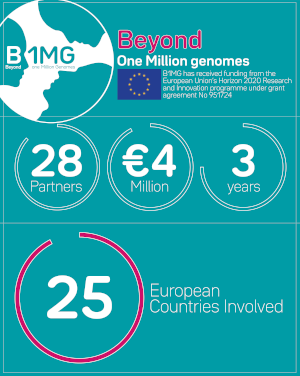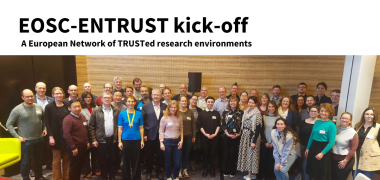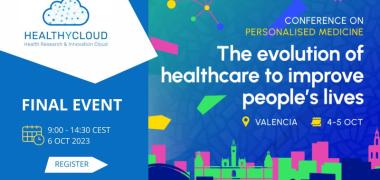B1MG project (Beyond One Million Genomes) launched
The project’s purpose is to support the implementation of the declaration of cooperation ‘Towards access to at least 1 million sequenced genomes in the EU by 2022, known as the ‘1+ Million Genomes’ initiative (1+MG). Today, 22 signatory countries work together to ensure that the objectives are met by 2022, to ultimately improve disease prevention, personalised treatment and clinical research.
 Until now, Member States have been working to initiate these efforts through ad-hoc working groups, but without the benefit of a formal coordination project to offer structure and international collaboration. The B1MG project provides the required coordination, support and expertise to move ‘beyond’ the 1M genome target and ‘beyond’ the 21 signatory countries of the original initiative.
Until now, Member States have been working to initiate these efforts through ad-hoc working groups, but without the benefit of a formal coordination project to offer structure and international collaboration. The B1MG project provides the required coordination, support and expertise to move ‘beyond’ the 1M genome target and ‘beyond’ the 21 signatory countries of the original initiative.
ECRIN
The B1MG project strives to bring together key infrastructures as for example ECRIN, sequencing projects and member state representatives, and the voices of diverse stakeholders — including patients. By doing so, the project will ensure the delivery of the 1+MG initiative objectives, such as ensuring data quality, high exchange standards, secure access protocols and excellent legal guidance. Serena Scollen, B1MG Project Coordinator said:
I am delighted that the project brings together Europe’s leading infrastructures and research organisations to guarantee the implementation of the 1+MG initiative and drive the development of European infrastructure for federated and secure cross-border access to personalised medicine.
The three-year project will have a significant impact on society, as it will offer clear guidance to implement personalised medicine, at a local, regional and national scale. Personalised medicine, which considers people’s genetic makeup, can yield notable socio-economic benefits:
- More efficient national health systems
- Faster and more accurate diagnosis
- Better health
- Better quality of life
- Increased life expectancy
The benefits are countless. For example, access to larger cohorts provides a richer pool of data for researchers studying rare genetic diseases. It also ensures better interoperability between the sequencing research data and electronic health records. Consequently, clinicians will be empowered to make informed decisions on the best patient-specific treatments.
More information on the project website https://b1mg-project.eu




